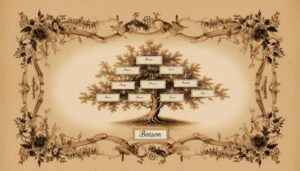Carol Name Meaning and Origin
The name Carol derives from the Old French term 'carole', linked to Latin 'choraula' and Greek 'choreia', indicating a dance or song of joy. In English-speaking cultures, Carol became a unisex given name, rooted in the Old Germanic 'karal', akin to Charles and Carl.
It conveys musical heritage and celebration, showcasing its importance. Historically, carols were integral to medieval European festivities and Christian celebrations by the 14th century.
Literature, too, highlights its association with joy, generosity, and community. Explore the cultural significance and evolution of Carol through its widespread popularity and global variations.

Key Takeaways
- Carol derives from the Old French term 'carole', meaning a dance or song of joy.
- The name has roots in the Latin 'choraula' and Greek 'choreia'.
- Carol evolved into a unisex given name in English-speaking countries.
- It is associated with joyous songs and Christian celebrations, particularly Christmas.
- Variants like Karolina and Carolina highlight its adaptability and cultural resonance.
Etymology of Carol
The name 'Carol' derives from the Old French term 'carole,' which originally referred to a type of dance or song of joyous character.
Linguistically, 'carole' finds its roots in the Latin 'choraula,' denoting a choral dance accompanied by music. This term further traces back to the Greek 'choreia,' associated with a circle or ring dance.
The evolution of 'carole' into a personal name is indicative of the term's positive connotations, embodying festivity and celebration.
Over time, 'Carol' evolved into a unisex given name, mainly gaining popularity in English-speaking countries in the 19th and 20th centuries.
This etymological journey underscores the name's rich linguistic heritage, encapsulating a legacy of joy and communal celebration.
Historical Background
The name Carol has its roots in medieval Europe, where it was often associated with the joyous songs sung during religious festivals. These 'caroles' were integral to communal celebrations and played a significant role in the Christian liturgical calendar.
Over time, the name Carol evolved linguistically and culturally, reflecting its enduring connection to both music and religious traditions.
Medieval European Roots
Rooted in Medieval Europe, the name Carol finds its origins in the Old Germanic word 'Karl,' which means 'free man.' This etymological foundation reflects the socio-political landscape of the time, where concepts of freedom and autonomy were highly valued. The implication of 'free man' underscored the societal status and individual liberties prevalent in medieval societies.
The name evolved linguistically through various European cultures, maintaining its core significance while adapting to regional dialects and phonetic preferences. Cultural adaptation saw the name Carol progress through languages like Latin and Old French, becoming a staple in European nomenclature.
Variants such as Charles and Carl emerged, showcasing the name’s flexibility. This linguistic evolution highlights the name’s ability to transcend borders and resonate across different linguistic frameworks. The name evokes a sense of heritage and timelessness, connecting modern bearers to their medieval ancestry. The Caroline name meaning, rooted in European history, adds depth and richness to the name’s significance. Its ability to adapt and evolve over time speaks to its enduring appeal and lasting impact. Whether it’s pronounced as Charles, Carl, or Caroline, the name continues to hold a special place in countless cultures and societies around the world.
Religious Song Influence
As the name Carol continued its progression through history, its association with religious songs, particularly Christmas carols, added a layer of cultural and spiritual significance.
Originating from the Old French term 'carole,' meaning a circle dance accompanied by singing, carols evolved during the medieval period into festive songs with a strong religious theme.
By the 14th century, these songs were integral to Christian celebrations, especially during the Christmas season. The linguistic shift from 'carole' to 'carol' also reflects the broader change in cultural practices, embedding the name deeply within religious and community traditions.
This historical context underscores the name Carol's enduring link to joy, celebration, and spiritual reverence, reinforcing its prominence in both secular and ecclesiastical spheres.
Linguistic Roots
The name 'Carol' originates from the Old Germanic word 'karal,' meaning 'free man,' and later evolved through the Latin 'Carolus.'
Historically, 'Carol' gained prominence through its association with Charles the Great, or Charlemagne, further cementing its usage in European nomenclature.
Linguistically, the name has undergone significant phonetic and morphological transformations, reflecting broader linguistic shifts across different eras and regions.
Etymology of Carol
Originating from the Old French name 'Carole,' the name Carol traces its linguistic roots to the Latin word 'choraula,' which referred to a choral song or dance. This connection underscores the name's inherent association with music and joyful celebration.
Linguistic evolution saw 'Carole' adopt a broader meaning in Middle English, signifying a round dance accompanied by singing. Over time, the term simplified to 'Carol,' retaining its melodic essence.
Key emotional evocations include:
- Musical Heritage: The name Carol evokes a sense of timeless musical tradition.
- Joyful Celebration: Rooted in dance and song, it carries connotations of festivity.
- Cultural Resonance: Reflecting a deep historical tapestry woven through languages.
- Enduring Legacy: A name that has transcended centuries, retaining its charm and significance.
Historical Name Usage
Carol's linguistic roots not only enrich its musical connotations but also reveal its historical usage across various cultures and epochs.
Originating from the Old French term 'carole,' meaning a circle dance accompanied by singing, the name Carol evolved through various linguistic stages.
In Medieval Latin, 'choraula' denoted a choral song or dance, reinforcing its association with joyous communal activities.
During the Middle Ages, the name gained popularity in Europe, often symbolizing festive celebrations.
In the 19th and 20th centuries, Carol became prevalent in English-speaking countries, spurred by literary references and the rise of Christmas carols.
This historical trajectory underscores the name's enduring appeal and multifaceted cultural significance, blending musical heritage with social traditions.
Carol in Literature
Throughout literary history, the name Carol has appeared in various works, often evoking themes of festivity and tradition. The name's association with Christmas carols imbues it with connotations of joy and celebration. In literature, Carol often symbolizes warmth, generosity, and the spirit of giving.
Notable instances include:
- 'A Christmas Carol' by Charles Dickens: This seminal work has cemented the association of the name with holiday cheer and moral redemption.
- 'Carol' by Patricia Highsmith: This novel explores themes of love and identity, presenting Carol as a complex, charismatic character.
- Poetry: Various poets use the term 'carol' to evoke imagery of song and festivity.
- Children's Literature: Carol often appears in stories that highlight community and shared joy, reflecting the name's festive origins.
Popularity Over Time
The literary resonance of the name Carol has paralleled its fluctuating popularity over time, reflecting broader cultural and societal trends. Originating from the Old Germanic name 'Karl,' meaning 'free man,' Carol peaked in the United States during the mid-20th century.
According to historical data, its prevalence surged in the 1930s through the 1960s, influenced by notable cultural figures and the post-war boom. The name aligns with the linguistic pattern of adopting consonant-heavy, two-syllable names, which were fashionable during that era.
However, its popularity has waned since the late 20th century, as contemporary naming conventions gravitate towards more varied and multicultural influences. This decline illustrates the dynamic nature of naming trends, continually evolving with societal changes.
Global Variations
Variations of the name Carol can be found across different cultures, each adapting the name through unique phonetic, linguistic, and historical influences.
In French, the name transforms into 'Carole,' indicating a slight phonetic shift while retaining its core sound.
The German adaptation, 'Karola,' incorporates a more robust consonantal structure.
In Eastern Europe, 'Karolina' emerges, blending traditional Slavic suffixes with the root name.
Spanish-speaking cultures present 'Carolina,' resonating with a softer, melodic tone.
To evoke a deeper emotional connection, consider these variations:
- Carole – French elegance and sophistication.
- Karola – German strength and tradition.
- Karolina – Eastern European heritage and warmth.
- Carolina – Spanish charm and musicality.
These variations highlight the name's adaptability and cultural resonance.
Famous People Named Carol
Numerous influential figures named Carol have left an indelible mark on history, spanning various fields such as literature, politics, and entertainment.
Carol Ann Duffy, a prominent British poet, served as the first female Poet Laureate in the United Kingdom, heralding a new era in contemporary poetry.
In the domain of politics, Carol Moseley Braun broke significant barriers as the first African American woman elected to the U.S. Senate.
The entertainment industry also boasts remarkable Carols, such as Carol Burnett, whose pioneering work in television comedy has earned her numerous accolades and a lasting legacy.
These individuals exemplify the multifaceted impact of the name Carol across diverse professional landscapes, illustrating its historical and cultural resonance.
Cultural Significance
Embedded within various cultural contexts, the name Carol holds rich historical and linguistic significance that transcends geographical boundaries. Originating from the Old Germanic word 'karl,' meaning 'free man,' Carol evolved through Latin and Old French to become a popular name in English-speaking countries.
Carol's cultural resonance is profound, reflected in various traditions and narratives:
- Medieval Festivals: Carol songs were integral to communal celebrations, symbolizing joy and community.
- Literary Influence: Charles Dickens' 'A Christmas Carol' immortalized the name, associating it with moral redemption and holiday spirit.
- Royal Connections: Historically linked to figures like Carol I of Romania, reinforcing its regal connotations.
- Modern Popularity: The name's adaptability has seen it embraced globally, reflecting cultural shifts and contemporary trends.
The name Carol represents a rich tapestry of cultural significance.
Conclusion
The name Carol, with deep etymological roots and historical significance, has traversed centuries, languages, and cultures. Examining its appearances in literature, its fluctuating popularity, and its global variations, one must ask: what continues to draw individuals to this enduring name?
Celebrated figures bearing the name further underscore its cultural impact. Essentially, Carol encapsulates a rich tapestry of linguistic, historical, and cultural threads, making it a name of enduring resonance and relevance.






